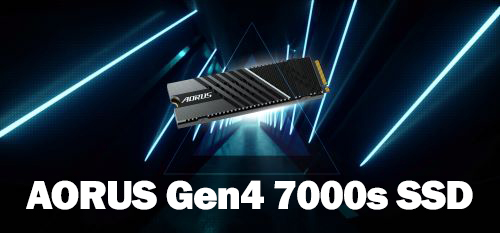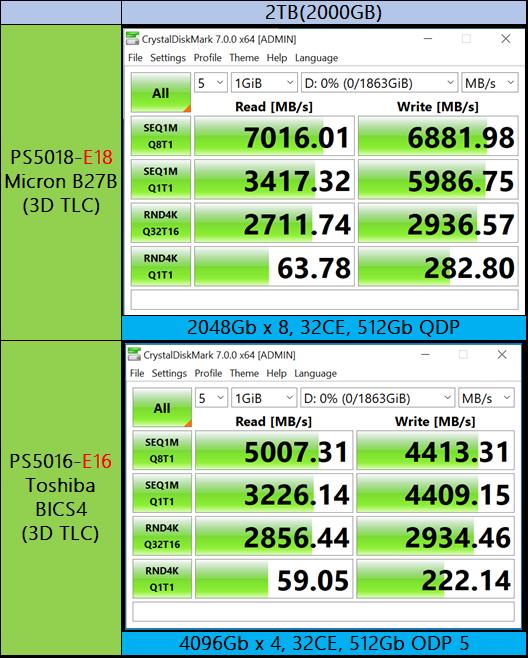
Gigabyte Technology announces their latest AORUS Gen4 7000s SSD with speeds of up to 7GB/s read speed. Enhanced with a new generation PCIe 4.0 controller with advanced 3D-TLC NAND Flash, it boosts up to 55% more performance that the previous generation PCIe 4.0 NVMe SSD. AORUS Gen4 7000s SSD come in two capacities: 1TB and 2TB. They both come in M.2 2280 Interface making installation easy. The SSD comes with a big aluminum thermal heat sink and is mounted using a double sided thermal pad with Nanocarbon coating for improved heat dissipation. Meanwhile, Gigabyte’s SSD Toolbox application provides instant overview and adjustments to the SSD’s state.
Quoting Gigabyte’s Jackson Hsu, Directory of the Gigabyte Channel Solutions Product Development Division on the SSD’s performance: “The storage devices are taking advantage of the PCIe 4.0 transfer speed that raised from 5GB/s to almost 8GB/s, which is great news for users who expect to optimize storage performance and reduce the bottle neck of system operation. AORUS Gen4 7000s SSDs further advance the standards set by our previous SSD products to provide users with breakthrough performance. After the OS installed, uses can enjoy unprecedented 7GB/s read speed with 1TB or 2TB storage capability. The thermal solution and the double-sided thermal pad are designed to slow down the throttling that might occur at high-speed operation of SSD, thus boost the system performance.”
Table of Contents
Performance

AORUS Gen4 7000s SSDs have the latest Phison E18 selected 8-channel controller, which provides users with ultimate random access rate. Also a high speed 3D-TLC NAND Flash and SLC cache design brings the PCIe 4.0 into full play. Under real test, AORUS Gen4 7000s SSD features read speeds of up to 7GB/s and write speed up to 6.85GB/s. This 55% faster than PCIe 4.0 NVMe SSD. It is two times faster than PCIe 3.0 SSD, and up to 13 times faster than SATA SSD. Enhanced by Phison’s E18 controller, AORUS Gen4 7000s SSD not only improves AI multitasking operation, but power up content creators, gamers, and users eager for extreme performance.
AORUS Gen4 7000s SSD Cooling with integrated Heat Sink

The high-speed SSD generates heat while on full speed operation. Normally an SSD implements thermal throttling as a safety measure to prevent data loss or wear. The thermal throttling feature engages in order to maintain stability and durability; however it slows down performance and reduces transfer rate. To keep AORUS Gen4 7000s SSD cool at operation, Gigabyte employs specially designed double-sided heat sink with its Nanocarbon coating. By utilizing the clearance area between motherboard slots; the thermal fins size can be maximized to enlarge the surface area for dissipation. This design supports different M.2 slots on various motherboards to avoid interference with VGA cards installed above the M.2 SSD. AORUS Gen4 7000s SSD also equip high conductivity thermal pad to improve heat dissipation by up to 30%, better than metal thermal pads.
Performance Heatsink Variant

For those who wanting an even more extreme thermal solution, AORUS Gen4 7000s SSDs come in another version. This version has a larger heat sink with integrated heat-pipes. With the same double-sided heat spreader with Nanocarbon coating and high conductivity pad design, but with a bigger dissipation area; promising consistent cooling and high performance for water cooling systems.
Gigabyte Support
AORUS Gen4 7000s SSD features PCIe 4.0 NVMe M.2 interface design. To get the breakthrough performance of read speed up to 7GB/s, use of AMD X570 / B550 motherboards or Intel Z490 motherboards with next-gen Intel® Core™ processors supported are highly-recommended. With GIGABYTE R&D’s professional adjustment, comprehensive verification, software enhancement, and the 5 years warranty service, GIGABYTE motherboards offers more stability with higher performance, which is definitely the best choice for users.
For more information, please visit GIGABYTE’s official website for the SSD





